By Richard Rodgers and Oscar Hammerstein II. Book by Howard Lindsay and Russel Crouse. Willoughby Theatre Company. Director: Adam Haynes. The Concourse, Chatswood. 12 – 27 May, 2023
Reviewed : 12* & 13 May, 2023
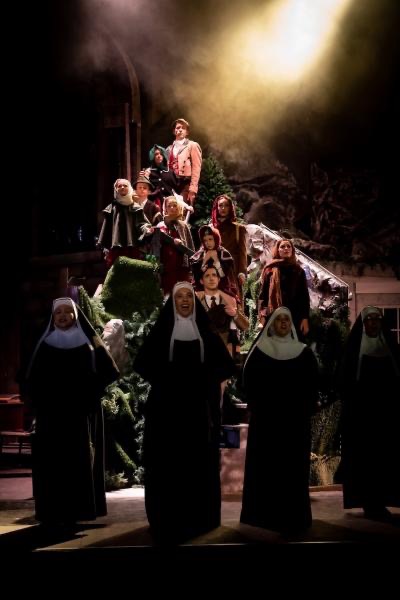
What a triumph for Willoughby Theatre Company!
The Von Trapp family has made its jubilant, musical way to Chatswood and the Concourse is alive with The Sound of Music. Heralded by a magnificent choir of fourteen nuns, they take the audience back in time to 1938 as the Third Reich invades Austria, and those who resist are swept away – unless, like the von Trapps, they have the courage to escape.
Based on that brave escape, The Sound of Music is a love story with a difference. There’s politics and history, religion and tradition, submission and defiance, lots of lovely music – and a family of seven children.
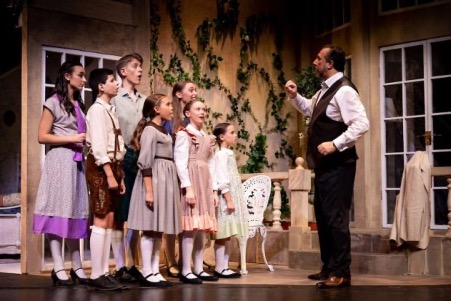
Photos : supplied
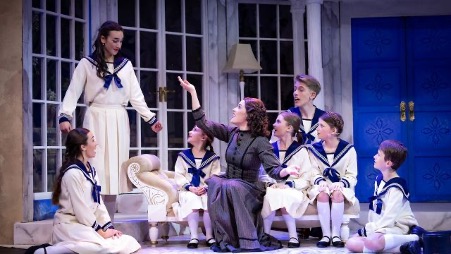 Adam Haynes obviously kept all of this in mind as he deftly and sensitively brought this very professional and moving production to the stage. There is care and sincerity in every scene. He has fostered the intimacy of a family torn apart by loss then brought together by love … and music. Yet he has also realised the humour and lightness that Howard Lindsay and Russel Crouse wrote into the dialogue and Rodgers and Hammerstein made famous in the songs.
Adam Haynes obviously kept all of this in mind as he deftly and sensitively brought this very professional and moving production to the stage. There is care and sincerity in every scene. He has fostered the intimacy of a family torn apart by loss then brought together by love … and music. Yet he has also realised the humour and lightness that Howard Lindsay and Russel Crouse wrote into the dialogue and Rodgers and Hammerstein made famous in the songs.
This production is one of which the whole company should be very proud. The meticulous direction is matched by Janina Hamerlok’s creative and carefully instructed choreography and Callum Tolhurst-Close’s adroit musical direction. Together they have succeeded in producing a fresh, original interpretation of a much-loved musical. Not an easy achievement when they are also managing a cast of 40, ten of whom are children!
Working with children requires care and sensitivity. Working with two different sets of children as “regulated” can be even more tricky. Characterisation, blocking, movement, songs must be explained simply and explicitly. It takes a more than good direction! It takes understanding and firm, gentle command. From discussion with some of the young cast members and their parents, Haynes and his team achieved both admirably, as well as ensuring that the young actors felt and looked confident alongside other cast members.
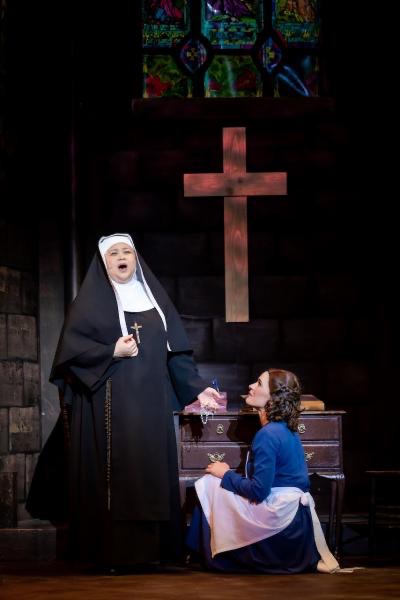
Haynes chose that cast with care and a perceptive eye. The rapport and sense of family that was fostered in rehearsal shines brightly in every scene.
It is Maria, the young novitiate-cum-governess to whom the children must relate most closely. She needs to be warm and empathetic. She needs to inspire respect. She also needs to be able to sing those very familiar songs! Felicity Caldwell does all of this and more. There is warmth and tenderness in her performance. It begins with her deference to the nuns at the abbey. It wraps itself around the children. It touches the heart of their father. And and reaches across the orchestra pit to embrace the audience. Caldwell creates a Maria that is her own, a Maria who fills the stage with both the “sound of music” and tender caring.
Marcus James Hurley is Captain Georg von Trapp, the wealthy widowed naval hero who has been left with seven children. Hurley finds all the contained control of this character, his sadness, his sense of responsibility and his staunch loyalty to his country. There is subtlety in the way he reveals the real intensity of the Captain’s character: his genuine love of his children; the almost bemused realisation of his feelings for Maria; his strong defiance of the German invaders. Nowhere is that intensity so clear than in his face as he sings the haunting “Edelwiess”.
His children are played by 12 young people. For rehearsal and for booking clarity, the two families are called The Ländler Cast (after the Austrian dance performed in Act 1), and the Edelweiss Cast.
In every performance Abbey Thomas and Jimmy Chapman play Leisl and Friedrich, the two oldest von Trapp children. Both are talented young performers, who bring a youthful sincerity and vitality to these special roles. They have also established a warm, convincing connection with their young siblings in both families – leading them affectionately but also providing strong exemplars of focus and control.
Lana Harmey and Helen Jordan play the mischievous, prank-playing Louisa. Gabriel Wright and Xavier Billett play the sensitive but thoughtful Kurt. Chloe Brown and Isabella Coffey are the intuitive Brigitta, while Lilou McKenzie and Cara Ryan play Marta, who wants a pink parasol for her birthday! The youngest of the children, Gretl is played by Amy Mogan and Penelope Mortimer.
How intriguing it must also have been for the directors and the older cast members to see these fledgling actors flexing their wings, becoming more comfortable and confident in their relationship with each other and their stage “father” and governess. There is a genuine warmth in the way both sets of children relate with Caldwell and Hurley – and in the way Caldwell and Hurley care about them, especially in the last scenes, as they sing together at the concert … and as they hide with the nuns in the Abbey Garden.
The nuns! Fourteen wonderful voices led by Tisha R. Kelemen as the Mother Abbess fill the Concourse with perfect harmony. Kelemen brings operatic splendour to her role, as well as the ability to find the integrity and understanding warmth of her character. I’m sure there have been few Mother Abbesses played so skilfully. Julia Brovedani is the disapproving Sister Bertha, Julianne Horne the warm-hearted Sister Margaretta and Georgia Kokkoris plays the supportive Sister Sophia.
Baroness Schraeder is played by Taryn-Lea Bright who finds the panache and flair of the wealthy widow as well as her fickleness. Bright is a skilled performer who is at home on the stage, using it confidently and effectively, whether charming von Trapp and the children, or conspiring in song with the even more fickle Max Detweiler, played by Clive Hobson.
Hobson is a strong force on the stage. He injects his Detweiler with pace and pushy over-confidence, finding all his cunning and wiliness, as well as his charm and persuasiveness. Detweiler is not a particularly nice character, but Hobson makes his charm much more memorable than his duplicity.
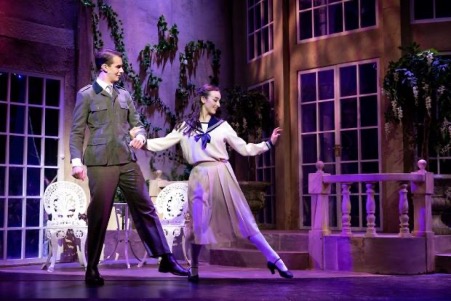
John Tilbrook returns to WTC as Franz, the aging factotum who served with von Trapp in the navy, and Nerida Walker is the diligent, loyal housekeeper, Frau Schmidt. Both bring belief and humour to these roles.
Rolf, the telegram boy who has won Liesl’s heart is played by Matthew de Meyrick. This is a relatively small part, but politically important to the plot and De Meyrick makes his gradual transition to Hitler Youth effectively and convincingly.
Tim Wotherspoon is Admiral von Schreiber and Mitchell Jacka the nasty Herr Zeller. They are also part of the ensemble who dance at the Captain’s gala dinner. That scene is one of the highlights of the production. The choreography is true to time and place and is explicitly rehearsed and timed. The tiny segment where eleven-year-old Kurt dances with Maria centres the scene, and the children’s goodnight song takes it to a picturesque conclusion.
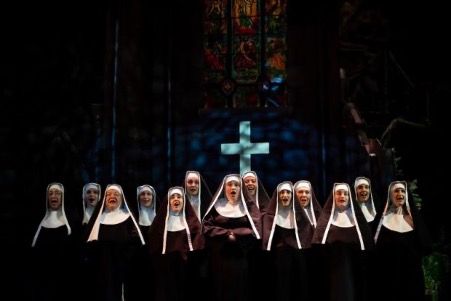
Picturesque is an apt word to describe this production. The set is stunning, the lighting, designed by Tom French, makes it even more stunning, gently illuminating special moments, and working in conjunction with Callum Tolhurst-Close and his hidden, but beautifully heard orchestra, to enhance the atmosphere of darker moments.
Adam Haynes, his creatives and all those working behind the scene – and there are many, including the parents who have buoyed their young actors through late nights and reluctant mornings and even now are working behind the scenes as chaperones – have every right to be very proud of a very professional and expertly reimagined production of this classic musical.
First published in Stage Whispers magazine
*Opening Night